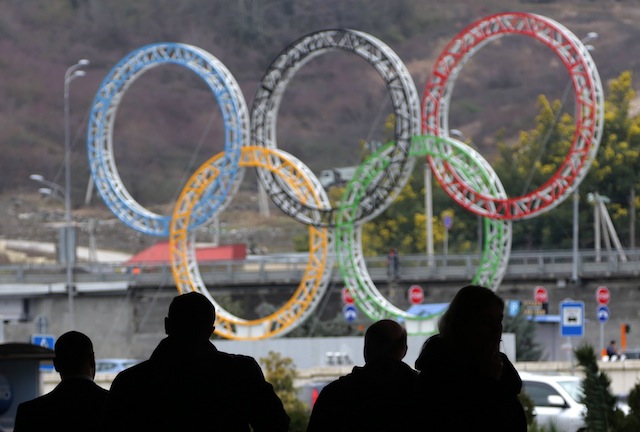SUMMARY
This is AI generated summarization, which may have errors. For context, always refer to the full article.

SOCHI, Russia – Russia on February 7 opens one of the most politically explosive Olympic Games since the Cold War, with concerns over the risk of militant attacks and a controversy over gay rights threatening to overshadow the winter sports extravaganza itself.
The world’s best skiers, skaters and sliders will be descending on Russia’s southern resort of Sochi for what promises to be two weeks of enthralling clashes between established sports legends and new stars.
Yet these Games have always had an unmistakable political hue after President Vladimir Putin personally championed the 2007 bid to host the event in Sochi, a resort at the foot of the Caucasus mountains close to the hotbed of an Islamist insurgency and a short drive north of the rebel Georgian region of Abkhazia.
Many scoffed at the idea of Russia holding the Games in the temperate Soviet-style resort that back in 2007 had next to no serious sports infrastructure at sea level or in the once almost virgin mountains above where the snow sports are to take place.
But after $50 billion in spending, half of it from the Russian budget and half from the private sector, the dream has now become a reality with new roads, hotels and sports infrastructure enveloping the coastline and mountains.
‘We need to realize big projects’
Putin has staked his reputation on holding a safe, well-run and enjoyable Games, which will be the biggest event for Russians since Moscow hosted the summer Olympic Games under the Soviet Union in 1980.
“It is not to do with my personal ambitions. It is in the direct interest of the state and our people,” Putin said in comments published by the Kremlin on Friday, January 17.
“After the collapse of the USSR and the bloody events in the Caucasus the general condition of our society was pessimistic and depressing. We needed to buck ourselves up. To understand and feel that we could realize big, extensive projects.”
Putin wants the Games to show off Russia to the world as a strong and dynamic power. But the fragility of this ambition was underlined in December when 34 people were killed and more than 100 wounded in successive suicide bombings in the southern city of Volgograd.
Doku Umarov, the chief of militants in the Caucasus which wants to impose an Islamist state in the region, threatened in July to stage attacks to stop the Games from taking place.
As if these problems were not enough, Russia managed to create a huge controversy of its own design last year by adopting legislation banning the dissemination of “gay propaganda” to minors.
Denounced by activists as a homophobic outrage, the law prompted calls for a boycott of the entire Games and means Russia’s stance on gay rights will be scrutinized for the duration for the Olympics.
Putin stoked the flames by saying that while gays “could feel themselves free, naturally, leave our children in peace please.”
Snubbed by world leaders?
The Games will get underway with a lavish opening ceremony to start at 2014 (1614 GMT) on the night of February 7 at the Fisht stadium in Sochi.
However many world leaders such as US President Barack Obama and French leader Francois Hollande will be absent in what some see as a snub to Russia but which Russian officials insist is in line with normal protocol.
In a sign of some sensitivity to Western concerns ahead of the Games, Putin in December pardoned Russia’s best known prisoner, the anti-Kremlin tycoon Mikhail Khodorkovsky and approved an amnesty that freed two Pussy Riot feminist punk rockers.
Russia has initially indicated it would ban all protests in Sochi during the Games but then appeared to bow to pressure by allowing rallies in a specially designated area.
However activists have ridiculed the idea as the zone is nowhere near the main focus of the Olympics, far out in the suburb of Khosta around 18 kilometers (11 miles) from the Olympic Cluster.
“The authorities need to stop harassing activists… or risk further tarnishing an Olympics already marred by controversy,” said Jane Buchanan, Europe and Central Asia associate director at Human Rights Watch.
She added that the International Olympic Committee (IOC) “had done a huge disservice to Russian activists by not challenging the Russian authorities” over protests.
Drones, lockdown and eavesdropping
Some 6,000 athletes, coaches and officials from 90 countries will line up to take part in 98 competitions from 7-23 February. In a sign of how the Games have expanded, there were just 250 athletes taking part in 16 competitions in the first edition in 1924 in Chamonix.
With 37,000 police from across the country to be deployed in Sochi and army units also operating, Russia is taking security measures that are even more strict then those imposed for the Olympic Games in China in 2008.
Sochi has already been subject to a security lockdown, with only authorized traffic allowed inside the city and shipping in the Black Sea restricted.
Dozens of drones will whirl in the sky to spot suspicious activity while all telephone calls and internet traffic will be monitored by the Federal Security Service (FSB).
Russia’s athletes will be under as much pressure on the ice or snow to bring back gold as its leaders will be to ensure a smoothly-run Games.
The country’s haul of just three golds from the Vancouver Games of 2010 was seen as a calamitous fall from the supremacy of the Soviet era. Sports Minister Vitaly Mutko wants Russia among the top five nations and at best a top-three place in the medal table. – Rappler.com
Add a comment
How does this make you feel?
There are no comments yet. Add your comment to start the conversation.